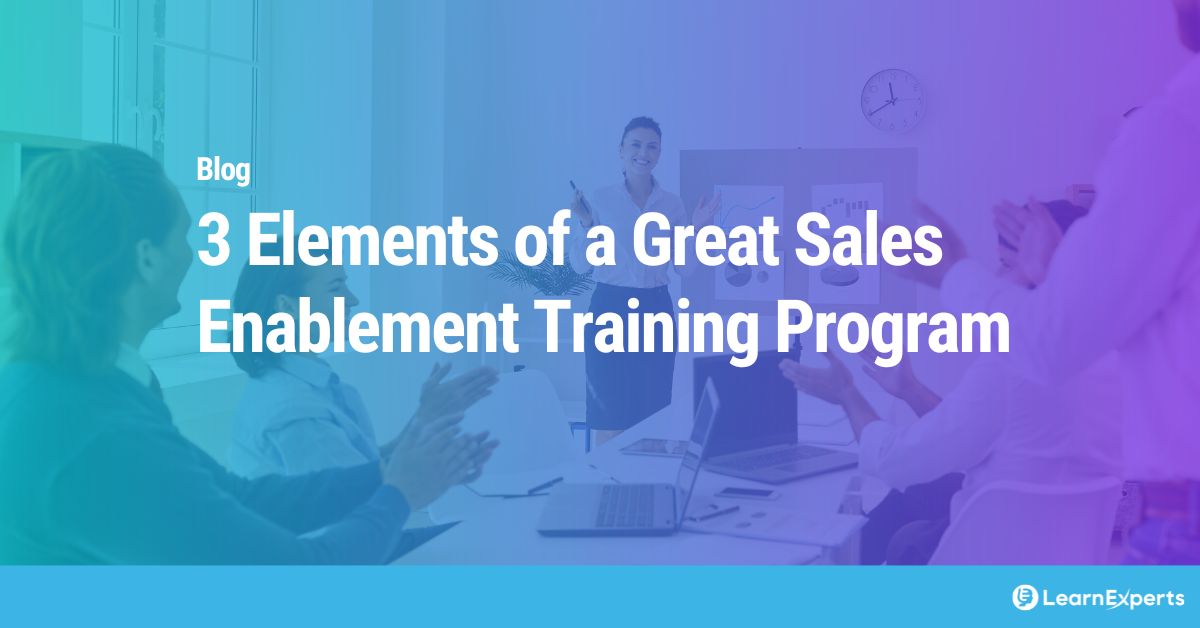A sales enablement training program helps your sales team increase their skills and knowledge and provides the resources and tools needed to sell your products or services effectively. In this blog, we cover the key topics that should be in a sales enablement training program.
Key takeaways
Build strong product knowledge with diverse formats like self-paced learning, expert-led sessions, and real-world case studies.
Train core sales skills including consultative selling, persona building, and objection handling through role-play and workshops.
Develop negotiation expertise by focusing on empathy, communication, and value-based strategies.
Ensure tech proficiency by training reps on CRMs and sales tools using eLearning and support materials.
Centralize and update training content to keep resources accessible, relevant, and consistent.
Continuously improve programs by gathering feedback and refreshing content to match evolving sales needs.
What is sales enablement training?
Sales enablement training refers to education and activities designed to equip employees involved in sales with the knowledge, skills, and tools they need to improve their capabilities, enhance their understanding of products or services, and help them navigate the sales process more effectively.
Key components of sales enablement training may include product knowledge, sales techniques, industry and market knowledge, sales process, and sales technology tools. Training can take various forms, including in-person workshops, online courses, eLearning, on-the-job training, mentoring, coaching and self-paced learning modules.
3 Key sales enablement training topics
Product knowledge training
Product, service or solution training is a must for a sales enablement training program. It equips the sales team with the essential knowledge that they will need to communicate what the product/service/solution does. More importantly, it prepares the sales teams with knowledge of how the offering can meet the customer’s needs and how to address any objections.
When designing product knowledge training, break the content into modules that cover tasks within functional areas. Depending on the complexity of the product, plan to deliver the training over several days or weeks to ensure that your audience has time to absorb the material.
When planning the delivery of product knowledge, include elements of self-paced, instructor-led, and hands-on training. Not only do you need eLearning courses, microlearning and presentations, but think about building a package that includes product manuals, quick reference guides, FAQs, diagrams and flowcharts, and case studies demonstrating how the product is used.
In addition to information about specific features and benefits, when planning product knowledge training, include how to differentiate your product or service from the competition. Consider including industry trends driving demand towards (or away) from yours and competing solutions. Feature-by-feature comparisons between solutions can also be beneficial.
Ensure every salesperson can interact with the product when planning your hands-on workshops. Plan for hands-on exercises that emulate how the customer uses the product. Include your industry and product experts in your seminars so they can answer questions and deliver more profound insights into why the product works in a certain way. An added benefit of including your experts is that they can assess how quickly the sales team is getting up to speed on the solution and how to articulate its differentiators.
Sales skills training
While knowing the product is essential, I think sales skills training is just as (if not more) important. Your sales team should have the skills to hunt for opportunities, build strong relationships, work with prospects through the sales process and close deals. Sales enablement skills to provide training for include:
Building selling strategies – A selling strategy is a planned approach to selling products or services that adds value to the customer while maximizing sales revenue and profitability for a company. These can vary by product, service, industry, geography and persona.
Your training for building a selling strategy should include modules on identifying and creating personas for the target audience(s), including buyers and influencers, determining the right sales channel (direct sales, online sales, or partnerships) and building a pricing strategy.
When considering selling approaches, you can include training on:
- Consultative selling: Understanding individual needs and offering solutions based on those needs.
- Solution selling: Identifying and solving customer problems.
- Outbound selling: Using cold calls, emails, and other direct methods.
- Account-based selling: Targeting accounts with a personalized selling approach.
- Cross-selling and upselling: Encouraging the purchase of complementary products (cross-selling) or a higher-end product (upselling) to increase the value of each sale.
When considering objection handling, you can highlight the process whereby sales professionals address concerns, questions, or objections from prospects during the sales process. Include information on recognizing prospects’ objections and developing strategies and responses to handle objections effectively.
Not only should sales have the technical knowledge on how to identify and message objections, they should also be trained on the following:
- Active Listening: How to allow prospects to voice their objections entirely without interruption, seeking clarification and understanding the concerns thoroughly before formulating a response.
- Empathizing: Showing understanding and empathy towards the prospect’s concerns.
- Responding: Providing factual, clear, and respectful responses that address objections.
- Reframing: Changing a perceived disadvantage into an advantage.
- Trial Closing: After addressing objections, how to ask a trial closing question to gauge the prospect’s readiness to move forward.
Objection handling training is best with instructor-led training, mentorship, group discussions, hands-on workshops and role-playing.
For training on effective negotiation, you can focus on skills that involve finding a solution acceptable to all parties involved. Many skills taught in objection handling, including active listening, empathizing and responding, are helpful in honing negotiation skills. When planning training for negotiation skills, also include the following:
- Emotional intelligence: Being able to control one’s emotions, being calm in a crisis, understanding others’ emotions and approaching problems methodically.
- Critical thinking: How to analyze information to discern the underlying interests and to create value in negotiations.
- Persuasion: How to use logical, emotional, or cooperative appeals to convince others about your standpoint.
Like objection handling training, negotiation training should include a mixture of instructor-led training, group discussions, and role-playing.
Sales technology training
Sales technology training not only allows sales teams to increase productivity and improve outcomes, it also allows management to monitor sales performance and trends, allow for agile responses to market changes, view quarterly revenues and plan sales strategies. When planning sales technology training, plan to include modules on how to:
- Navigate and use the CRM, including managing leads, prospects, customers and opportunities.
- Enter and manage data to maintain a clean and reliable database.
- Set up and manage automation processes to reduce manual work.
- Use analytical tools to gather insights and make data-driven decisions.
- Generate and interpret various reports to monitor sales performance.
- Efficiently manage email and use email tracking tools.
- Use tools to enhance collaboration within the sales team and other departments.
- Leverage platforms like LinkedIn for social selling.
- Use tools to create engaging and effective presentations for clients.
Delivery of sales technology training is best via eLearning, microlearning and instructor-led training. Tools like FAQs, knowledge bases, and cheat sheets will aid learners in answering their questions during training sessions.
Best practices to keep in mind
Remember to store all the assets in a single location to make it easier for your audience to reference the material. Plan to update your training content frequently, especially your product training, to capture changes in products, markets and competition. You will also want to incorporate feedback to increase the effectiveness of the content.
Run your training frequently for new sales reps and to refresh the knowledge of existing staff. You will also want to change the format and exercises for workshops and sales skills training to help encourage your seasoned sales reps to participate and engage.
LEAi – sales enablement training technology
LEAi by LearnExperts allows companies to quickly build tailored content for sales enablement training programs that help teams upskill and learn product, process methodologies and messaging. Our AI-enabled tool allows trainers to take their existing Word, PDFs and PowerPoint presentations and convert them into content for eLearning courses, microlearning, presentations for instructor-led training and video scripts.
The tool also helps training creators build learning paths to build structured sales enablement training programs. Contact us to learn more about how LEAi and LearnExperts can help you!




